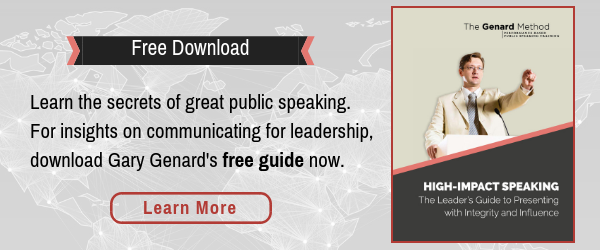 Do you have a high-stakes talk coming up? Don't muddle your key points! Follow these rules on how to make your message clear in important presentations.
Do you have a high-stakes talk coming up? Don't muddle your key points! Follow these rules on how to make your message clear in important presentations.
Here are two recent comments I'd like to share with you. They're from clients, both of whom happen to be physicians. And they both deal with developing a strong message in conference presentations.
Actually, they're laments on the state of medical communication these days. But they can be applied to any industry you'd like to name.
You've prepared great content. So why spoil it by using language that can interfere with your success? Download my free cheat sheet, "25 Words or Phrases to Avoid in Speeches and Presentations."
They concern the need to combine logic and audience comprehension with public speaking performance. Let me explain why that link may be stronger than you think.

Your Audience Shouldn't Say, 'What's This All About?'
Let's take the second of the two comments first. This client works in medical affairs for a leading pharmaceutical company. That means he's on the front lines where product development meets the need to communicate benefits to the medical community. Among other things, that involves a heavy schedule of attending medical conferences.
When we met for our weekly session recently, I asked the question that's always on the agenda in my coaching practice: Have you experienced anything since our last session concerning the areas you and I are working on? That usually elicits comments or questions regarding a speech or presentation this client gave, or a talk they listened to.
This time, it was the latter. My client had just returned from a trip that included two healthcare conferences. He said (to paraphrase): "You know, most of the time I couldn't tell what the key message was. I had trouble figuring out the important points the speaker was discussing."
That's a rather fatal disease when it comes to a medical talk, wouldn't you say? Unfortunately, it's a common occurrence in scientific, analytical, or financial presentations where a significant amount of data must be shared. The problem, of course, is that these talks are usually presented as a steady stream of content that isn't part of a coherent and engaging narrative. If that's what happens, is it surprising that listeners can't discern the key points—not to mention the overall message being conveyed?
The solution is this: Plan your talk in every way with your audience in mind. As obvious and intuitive as that sounds, we don't usually proceed this way. Our focus on our content often supersedes our relationship with our audience. Ask yourself, then, how listeners will make sense of what you're saying. That will almost always mean aiming for greater simplification and clarity. And you'll probably find yourself pacing your presentation differently, by proceeding more slowly and allowing time for key points to be absorbed and understood.

That's Great Content! Now How's Your Performance?
Which brings us to performance, and the other recent comment I heard. This time, my client was a hematologist specializing in multiple myeloma. She was lamenting the time and effort she spends attending international conferences to hear a leading researcher in her field speak. Unfortunately, she finds herself instantly losing interest (along with the rest of the audience) because the speaker is mind-numbingly reading directly from a paper. (If you attend many academic conferences, you probably have the same complaint.)
She complained: "I travel abroad to a conference just to hear this physician or scientist speak, only to realize that I've wasted my time." Then she added: "Are you ever needed in my profession to help physicians with their presentation skills!"
While it's true that a speech coach can get you up to speed fast, here are four helpful performance tools you can use on your own. They will help you map out your message so that audiences can hear and differentiate the key points you're making:
Vocal modulation: Scientists (and business professionals) often flatten out their voice to discuss serious topics. But not only does this diminish an audience's belief in your commitment and passion for your message. Listeners need vocal modulation—specifically emphasis and pitch inflection—to be able to separate the highlights of your talk from supporting information.
Signposts: This term refers to words or phrases you use to alert listeners that what you're about to say is worth remembering. Common signposts include "Let me repeat that," and "Significantly," and "The thought I'd like to leave you with." Using targeted phrases to foster attentiveness and aid retention really is like holding up a sign, isn't it?
Transitions: When you move from one main point to the next, you need an effective transition. It's a key technique for allowing audiences to keep each idea separate. That's important to allow them to take a "mental breath" and be able to absorb each major segment of your talk. Speakers often don't think about transitions because they know how the parts of the speech fit together; but the audience, of course, doesn't have that knowledge.
Pauses: For audiences to be able to take that mental breath mentioned above, you need to pause. Adrenaline and nervousness can turn us into motor-mouths in a presentation, so that the audience feels exhausted! Pausing effectively on the other hand, as you deliver a speech at precisely the pace you want to, is evidence of confidence and leadership. A pause is a signpost that says, "That was that. Got it? Now here comes something new and interesting."
Your audience needs that type of pacing to be able to follow you comfortably, as well as retain what you're saying. In other words, to understand the message in your important presentation.
You should follow me on Twitter here.



